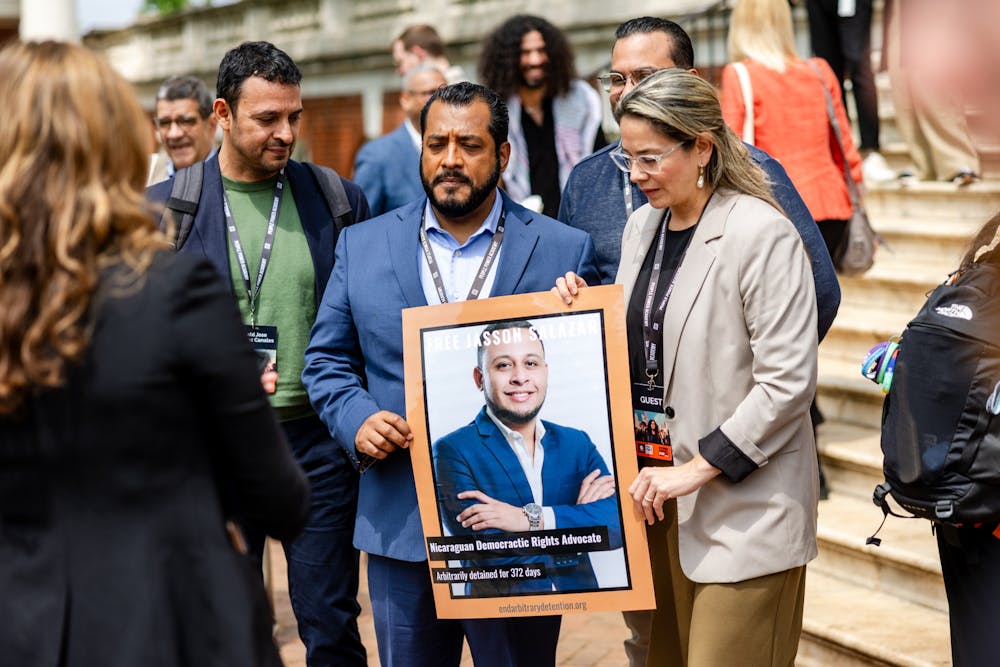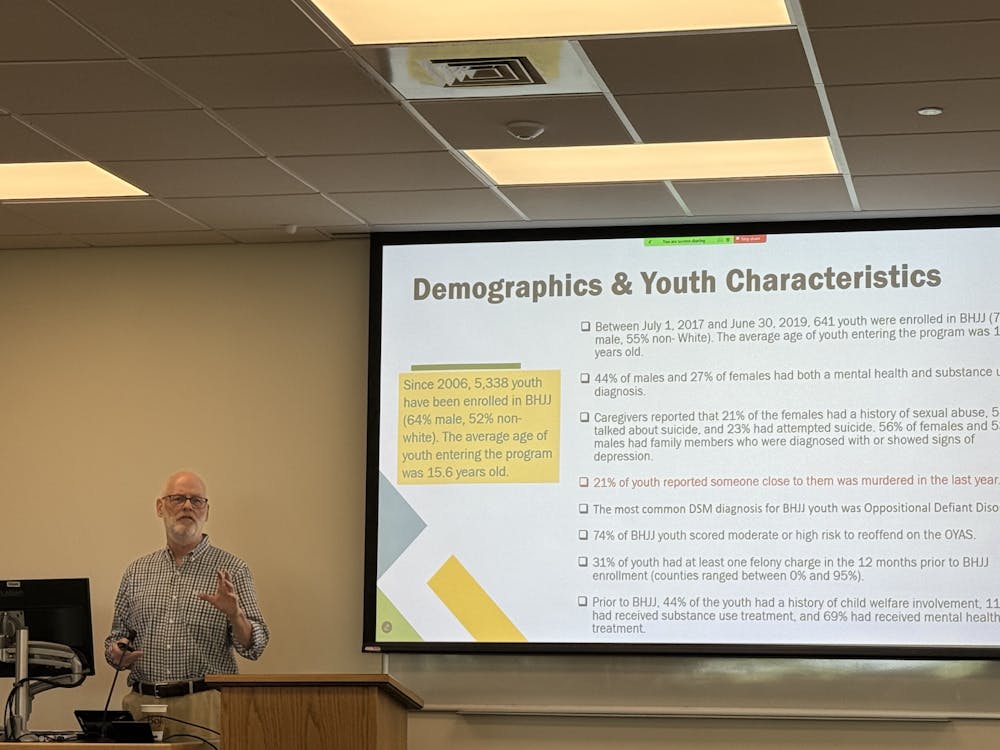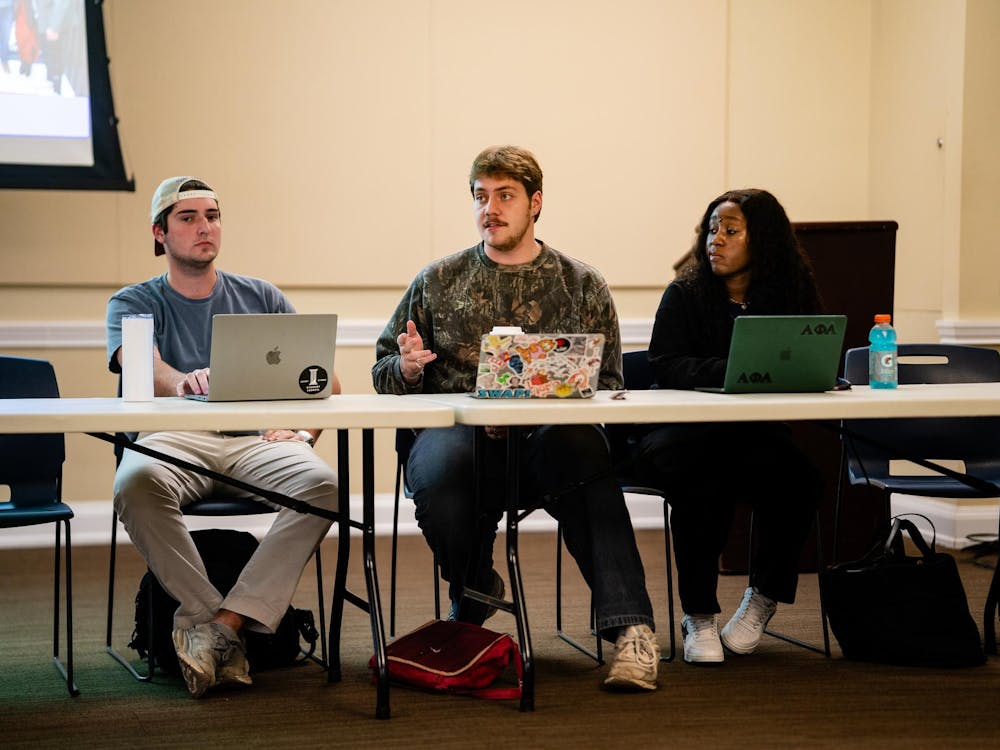Felix Maradiaga — Democratic Futures Project fellow, Nicaraguan political activist and Nobel Peace Prize nominee — announced his campaign to end arbitrary detention on the Rotunda steps Friday. His announcement was part of a three-day conference from April 26 to 28 entitled “People Power Academy,” featuring panels and keynote speeches with several nobel prize nominees and political activists exploring themes of democracy and non-violent activism.
According to the campaign’s website, which went live Friday, the Project for Protection against Arbitrary Detention works to promote an international treaty prohibiting arbitrary detention of individuals involved in political activities — this treaty is an agreement which countries would agree to voluntarily.
Arbitrary detention refers to when an individual is arrested and detained by a government without due process, or when an individual is detained without any legal basis for the deprivation of liberty, according to the Center for Justice and Accountability. According to Maradiaga, dictators use arbitrary detention in order to suppress dissenters around the world, and over a million families around the world have loved ones in arbitrary detention.
Maradiaga said the goal for the movement is to become a network of different entities and organizations that will offer a number of services to pro-democracy dissidents who are in prison around the world. The campaign does not support any one ideological issue or political party, according to Maradiaga, but it supports people’s ability to freely express their ideas without imprisonment.
Maradiaga is a fellow of the Democratic Futures Project, run by the Karsh Institute of Democracy, which brings in democracy advocates from around the world to engage with University students and partner with researchers. Maradiaga said the campaign needed a home for their platform, and the University was the first institution to respond and offer him and his partners resources including legal services, student volunteers through partner classes and the support of the Democratic Futures Project.
In his announcement, Maradiaga said the campaign’s organizers were delivering on their promise of building a project that will develop a treaty that bans dictators’ from arbitrarily incarcerating political dissidents.
“We invite you to join this global movement to be the beacon of hope for the families of political prisoners, and to let political prisoners from all around the world who have suffered arbitrary detention know that they are not alone,” Maradiaga said.
Maradiaga is a former political prisoner himself. Maradiaga told the Washington Post in 2021 that he was arbitrarily arrested after announcing his campaign for the Nicaraguan presidency. He said that the current president in power arrested him on the basis of false accusations that he was organizing terrorist acts. He suffered inhumane conditions for 21 months until he was expelled from Nicaragua and revoked of his citizenship.
Maradiaga made the announcement surrounded by student volunteers and activists in attendance at the conference, each holding signs with pictures and descriptions of pro-democracy activists around the world who are currently detained. He said he hopes that with enough attention from average citizens who can share the campaign on social media and contact their legislators, they can mobilize politicians to approve a treaty once it is established.
“Our aim is to become the largest global movement from the grassroots supporting political prisoners,” Maradiaga said.
Maradiaga said that once the campaign gathers enough volunteers from individuals and organizations around the world, the campaign organizers will do a global tour to persuade governments to adopt the treaty.
Stephen Parks, chair of the Democratic Futures Project and English Prof., said the Democratic Futures Project supports the research of democracy advocates, such as Maradiaga, and sponsors undergraduate classes for students to take part in those advocates’ work. Parks taught a class this semester, ENWR 2520, where his students supported Maradiaga’s campaign by researching profiles of political advocates detained around the world and interviewing their families.
“If students are given a chance to work with these advocates, they can learn how to take seemingly impossible problems and bring them down to a scale where they can have agency,” Parks said.
First-year College student Will Hickey, one of the students in Parks’ class, said he didn’t know a lot about arbitrary detention prior to taking the course, but the class brought in activists and former political prisoners to share their experiences which taught him more about the subject and made him more interested.
“There were a lot of very personal stories about what's happening when people are in prison. I think that really had a pretty deep impact [on me],” Hickey said.
In addition to running the campaign, Maradiaga serves as the president of the Foundation for the Freedom of Nicaragua and a board trustee for the Freedom House, a non-profit organization focused on political advocacy for democracy and human rights. He is also a Nobel Peace Prize nominee for his defense of religious freedom in Nicaragua.
According to Maradiaga, the campaign is in contact with political prisoners from 52 countries so far, including Nicaragua. He said that the campaign is only providing legal support to political prisoners in 10 of these countries, however, because the campaign is in its early stages and presently has limited resources.
In addition to the University, the campaign is also supported by multiple foundations, including the Human Rights Foundation and Geneva Summit for Human Rights and Democracy.
“This is a movement that will save lives and will elevate the ethics and the morality of human dignity around the world,” Maradiaga said. “Nobody deserves to be incarcerated for thinking differently.”







